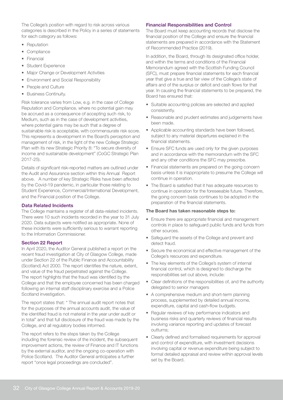
32 City of Glasgow College Annual Report & Accounts 2019-20
The College's position with regard to risk across various
categories is described in the Policy in a series of statements
for each category as follows:
• Reputation
• Compliance
• Financial
• Student Experience
• Major Change or Development Activities
• Environment and Social Responsibility
• People and Culture
• Business Continuity.
Risk tolerance varies from Low, e.g. in the case of College
Reputation and Compliance, where no potential gain may
be accrued as a consequence of accepting such risk, to
Medium, such as in the case of development activities,
where potential gains may be such that a degree of
sustainable risk is acceptable, with commensurate risk score.
This represents a development in the Board's perception and
management of risk, in the light of the new College Strategic
Plan with its new Strategic Priority 8: "To secure diversity of
income and sustainable development" (CoGC Strategic Plan
2017-25).
Details of significant risk-reported matters are outlined under
the Audit and Assurance section within this Annual Report
above. A number of key Strategic Risks have been affected
by the Covid-19 pandemic, in particular those relating to
Student Experience, Commercial/International Development,
and the Financial position of the College.
Data Related Incidents
The College maintains a register of all data-related incidents.
There were 10 such incidents recorded in the year to 31 July
2020. Data subjects were notified as appropriate. None of
these incidents were sufficiently serious to warrant reporting
to the Information Commissioner.
Section 22 Report
In April 2020, the Auditor General published a report on the
recent fraud investigation at City of Glasgow College, made
under Section 22 of the Public Finance and Accountability
(Scotland) Act 2000. The report identifies the nature, extent,
and value of the fraud perpetrated against the College.
The report highlights that the fraud was identified by the
College and that the employee concerned has been charged
following an internal staff disciplinary exercise and a Police
Scotland investigation.
The report states that: " The annual audit report notes that
for the purposes of the annual accounts audit, the value of
the identified fraud is not material in the year under audit or
in total" and that full disclosure of the fraud was made by the
College, and all regulatory bodies informed.
The report refers to the steps taken by the College
including the forensic review of the incident, the subsequent
improvement actions, the review of Finance and IT functions
by the external auditor, and the ongoing co-operation with
Police Scotland. The Auditor General anticipates a further
report "once legal proceedings are concluded".
Financial Responsibilities and Control
The Board must keep accounting records that disclose the
financial position of the College and ensure the financial
statements are prepared in accordance with the Statement
of Recommended Practice (2019).
In addition, the Board, through its designated office holder,
and within the terms and conditions of the Financial
Memorandum agreed with the Scottish Funding Council
(SFC), must prepare financial statements for each financial
year that give a true and fair view of the College's state of
affairs and of the surplus or deficit and cash flows for that
year. In causing the financial statements to be prepared, the
Board has ensured that:
• Suitable accounting policies are selected and applied
consistently.
• Reasonable and prudent estimates and judgements have
been made.
• Applicable accounting standards have been followed,
subject to any material departures explained in the
financial statements.
• Ensure SFC funds are used only for the given purposes
and in accordance with the memorandum with the SFC
and any other conditions the SFC may prescribe.
• Financial statements are prepared on the going concern
basis unless it is inappropriate to presume the College will
continue in operation.
• The Board is satisfied that it has adequate resources to
continue in operation for the foreseeable future. Therefore,
the going concern basis continues to be adopted in the
preparation of the financial statements.
The Board has taken reasonable steps to:
• Ensure there are appropriate financial and management
controls in place to safeguard public funds and funds from
other sources.
• Safeguard the assets of the College and prevent and
detect fraud.
• Secure the economical and effective management of the
College's resources and expenditure.
• The key elements of the College's system of internal
financial control, which is designed to discharge the
responsibilities set out above, include:
• Clear definitions of the responsibilities of, and the authority
delegated to senior managers
• A comprehensive medium and short-term planning
process, supplemented by detailed annual income,
expenditure, capital and cash-flow budgets.
• Regular reviews of key performance indicators and
business risks and quarterly reviews of financial results
involving variance reporting and updates of forecast
outturns;
• Clearly defined and formalised requirements for approval
and control of expenditure, with investment decisions
involving capital or revenue expenditure being subject to
formal detailed appraisal and review within approval levels
set by the Board.